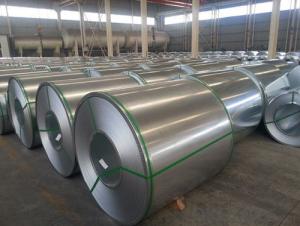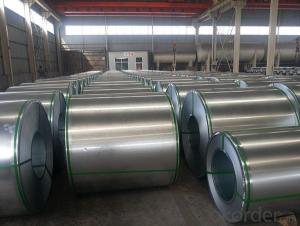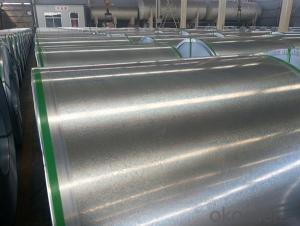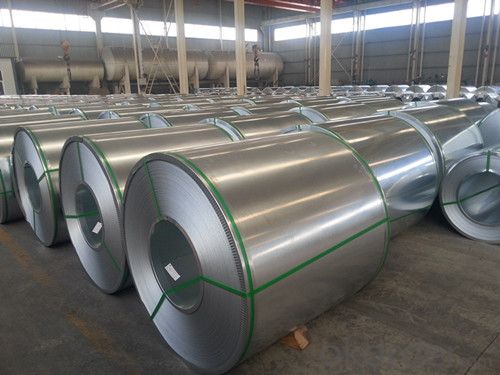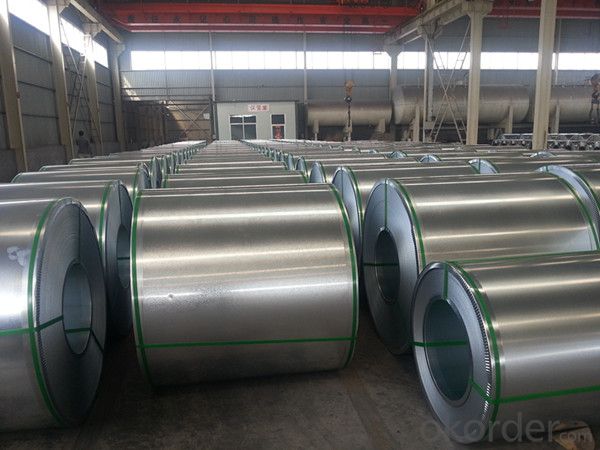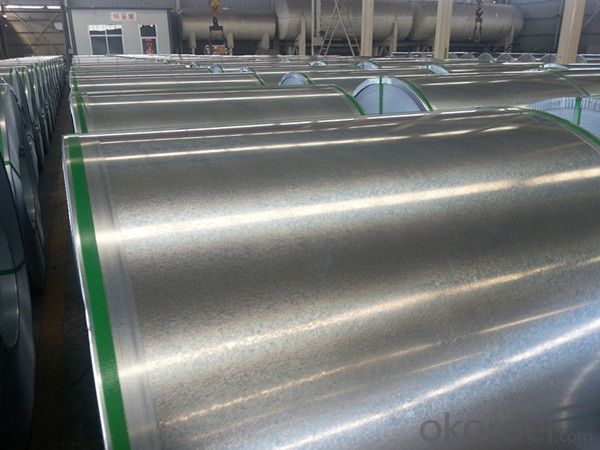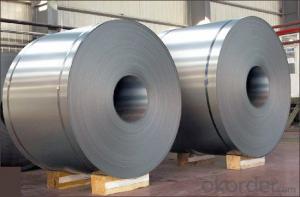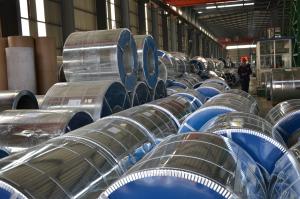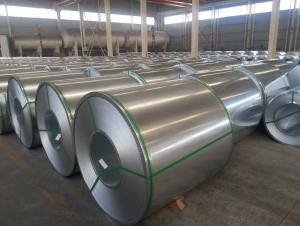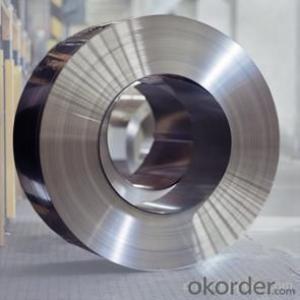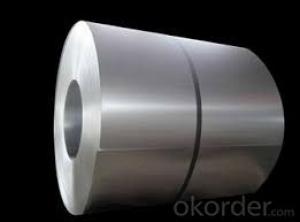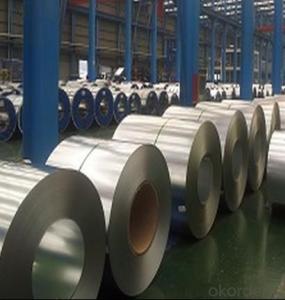Galvalume Steel Coils for Making PPGI and Corrugated Steel
- Loading Port:
- China main port
- Payment Terms:
- TT OR LC
- Min Order Qty:
- 25 m.t.
- Supply Capability:
- 100000 m.t./month
OKorder Service Pledge
OKorder Financial Service
You Might Also Like
Commodity | Hot dip galvanized steel coil and sheet |
Technical Standard: | JIS 3302 / ASTM A653 / EN10143 |
Grade | DX51D / DX52D/ DX53D/ S250,280,320GD |
Types: | Commercial / Drawing / Deep Drawing / Structural quality |
Width | 500/650/726/820/914/1000/1200/1219/1220/1250mm |
Thickness | 0.12-2.8mm |
Type of coating: | Galvanized |
Zinc coating | Z30-275g/m2 |
Surface Treatment | Chromed / Skin-pass/ Oiled/Slightly Oiled/ Dry/ Anti-fingerprint |
Surface structure: | Zero spangle / minimized spangle / regular spangle/ big spangle |
ID coil | 508mm or 610mm |
Coil weight | 3-8 MT per coil |
Package: | Properly packed for ocean freight exportation in 20''containers |
Application: | Industrial panels, roofing and siding for painting |
Price terms | FOB,CFR,CIF |
Payment terms | T/T or L/C |
Delivery time | Within 30 days |
Remarks | Insurance is all risks |
MTC will be handed on with shipping documents | |
We accept the third party certification test,such as SGS/BV |
Hot dipped galvanized coil Technical Data
Chemical Composition | ||||||
GRADE | C | Si | Mn | P | S | Ti |
SGCC/DX51D+Z | ≤0.10 | ≤0.50 | ≤0.60 | ≤0.10 | ≤0.030 | ≤0.020 |
DX52D+Z | ≤0.10 | ≤0.50 | ≤0.60 | ≤0.10 | ≤0.030 | ≤0.020 |
SGCD/DX53D+Z | ≤0.10 | ≤0.30 | ≤0.50 | ≤0.05 | ≤0.030 | ≤0.020 |
SGCE/DX54D+Z | ≤0.10 | ≤0.30 | ≤0.30 | ≤0.03 | ≤0.020 | ≤0.020 |
DX56D+Z | ≤0.10 | ≤0.30 | ≤0.30 | ≤0.03 | ≤0.020 | ≤0.020 |
Structural | ≤0.20 | ≤0.60 | ≤1.70 | ≤0.10 | ≤0.045 | |
Hot dipped galvanized steel coil Mechanical Properties | |||
GRADE | Yield Strength MPa | Tensile Strength MPa | Elongation % |
SGCC(DX51D+Z) | ≥205 | ≥270 | - |
SGCD(DX53D+Z) | - | ≥270 | 38 |
SGCE(DX54D+Z) | - | ≥270 | 40 |
DX56D+Z | - | ≥270 | 42 |
- Q: Does steel contain nickel?
- *Most of the grades of stainless steel contains nickle except few grades of ferritic/Martensitic stainless steel. For example , SAE416 / SAE 420 does not contain Nickle. See Stainless steel designations table at following link:
- Q: How do steel coils contribute to corrosion resistance in products?
- Steel coils contribute to corrosion resistance in products by providing a protective layer that prevents direct contact between the steel surface and corrosive elements in the environment. The coil coating process involves applying a protective coating, such as zinc, to the steel surface, forming a barrier against moisture, chemicals, and other corrosive agents. This coating acts as a sacrificial layer, corroding in place of the steel, thereby extending the lifespan and enhancing the durability of the products.
- Q: I have heartgold and I don't have a steel type Pokemon to beat lapras. HELP
- magneton. steel and electric type
- Q: How are steel coils protected against moisture and humidity?
- Steel coils are typically protected against moisture and humidity through various methods such as applying a protective coating or wrapping the coils with moisture-resistant materials, such as plastic or wax paper. Additionally, storing the coils in a dry and controlled environment, such as a warehouse with proper ventilation, helps prevent moisture absorption.
- Q: How are steel coils used in the manufacturing of HVAC ductwork?
- Steel coils are used in the manufacturing of HVAC ductwork as they provide the necessary strength and durability required for the ductwork. These coils are typically processed through a roll-forming machine, which shapes them into the required ductwork profile. The steel coils are then cut to the desired length, welded or joined together, and finally, coated to prevent corrosion and improve the overall performance of the ductwork.
- Q: What are the different coil slitting line configurations used for steel coils?
- There are several different coil slitting line configurations used for steel coils, including the looping pit slitting line, the looping tower slitting line, the non-looping slitting line, and the traveling head slitting line. Each configuration offers unique advantages and is suited for specific applications and production requirements.
- Q: Why is steel used for building purpose and not any other metal?
- Steel is used for building purpose because of its steadfast quality. The steel has an intense resistance which renders it completely immune to dangers of corrosion, climatic variations, weather fluctuations and other environmental hazards, thereby making it the most suitable metal for exterior surface of the building. Internal structure of steel also helps the building to have strength at the core which enables it to stand erect for a longer time.
- Q: How are steel coils used in the production of electrical transmission towers?
- Steel coils are used in the production of electrical transmission towers as they are shaped and welded to create the structural framework of the towers. The coils are unrolled, cut, and formed into the required shape, providing strength and stability to support power lines and equipment.
- Q: what is the refining process doing to raw materials in steel
- As Mr. Perfessor says, refining raw steel involves a lot of purifications of the raw steel; and to expand a bit, these refining processes also add corrosion-resistances to certain graded steels, and durability factors, when heat-tempering processes are used. All of these refining processes, and coating processes help steel products last when exposed to moistures, salts, and other corrosive conditions that steel can be exposed to, whether the steel is in open-air/water/space, embedded in concretes and other masonry products, or part of a protective barrier system in power plants, engines, etc. Hope this also helps; the eggster.
- Q: I need help my new stainless steel cookware is sticking ? My first meal was nasty!
- One of two things can cause this. Either your pan bottoms are light weight, or you are cooking at too high a temperature.
Send your message to us
Galvalume Steel Coils for Making PPGI and Corrugated Steel
- Loading Port:
- China main port
- Payment Terms:
- TT OR LC
- Min Order Qty:
- 25 m.t.
- Supply Capability:
- 100000 m.t./month
OKorder Service Pledge
OKorder Financial Service
Similar products
Hot products
Hot Searches
Related keywords
